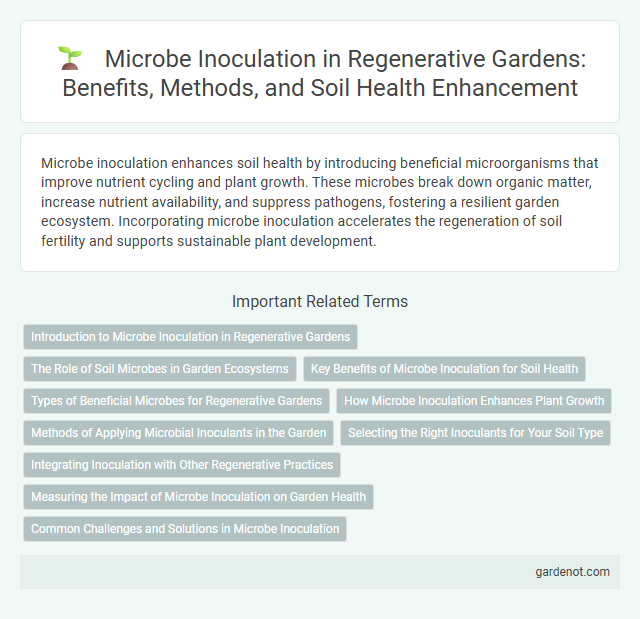Microbe inoculation enhances soil health by introducing beneficial microorganisms that improve nutrient cycling and plant growth. These microbes break down organic matter, increase nutrient availability, and suppress pathogens, fostering a resilient garden ecosystem. Incorporating microbe inoculation accelerates the regeneration of soil fertility and supports sustainable plant development.
Introduction to Microbe Inoculation in Regenerative Gardens
Microbe inoculation in regenerative gardens involves introducing beneficial microorganisms to soil to enhance nutrient cycling and plant health. These microbes, such as mycorrhizal fungi and nitrogen-fixing bacteria, improve soil structure, increase organic matter decomposition, and boost plant resilience against pests and diseases. Applying targeted microbial inoculants supports sustainable soil fertility and promotes long-term ecosystem balance in regenerative gardening systems.
The Role of Soil Microbes in Garden Ecosystems
Soil microbes play a crucial role in regenerative garden ecosystems by enhancing nutrient cycling, improving soil structure, and promoting plant health through symbiotic relationships. Microbe inoculation introduces beneficial bacteria and fungi that increase organic matter decomposition and nitrogen fixation, leading to richer, more fertile soil. This biological activity supports robust root systems and increases plant resilience against pests and environmental stressors.
Key Benefits of Microbe Inoculation for Soil Health
Microbe inoculation significantly enhances soil health by boosting microbial diversity and activity, which improves nutrient cycling and organic matter decomposition. This process promotes root growth and disease resistance in plants by fostering beneficial symbiotic relationships with nitrogen-fixing bacteria and mycorrhizal fungi. Increased microbial biomass from inoculation also enhances soil structure and water retention, supporting sustainable regenerative gardening practices.
Types of Beneficial Microbes for Regenerative Gardens
Beneficial microbes in regenerative gardens include nitrogen-fixing bacteria such as Rhizobium and Azospirillum, which enhance soil fertility by converting atmospheric nitrogen into plant-usable forms. Mycorrhizal fungi, like arbuscular mycorrhizal fungi (AMF), form symbiotic relationships with plant roots, increasing water and nutrient uptake. Other key microbes, including phosphate-solubilizing bacteria and decomposing actinomycetes, improve nutrient cycling and organic matter breakdown, promoting overall soil health and plant resilience.
How Microbe Inoculation Enhances Plant Growth
Microbe inoculation introduces beneficial microorganisms such as mycorrhizal fungi and nitrogen-fixing bacteria into the soil, significantly enhancing nutrient uptake and improving root development. These microbes establish symbiotic relationships with plant roots, increasing resistance to pathogens and environmental stresses while facilitating efficient water absorption. Enhanced microbial activity in the rhizosphere promotes soil structure and fertility, resulting in accelerated plant growth and higher crop yields in regenerative garden systems.
Methods of Applying Microbial Inoculants in the Garden
Microbial inoculants can be applied in regenerative gardens through soil drenching, seed coating, and foliar sprays, each method enhancing microbial colonization and plant-microbe interactions. Soil drenching involves introducing liquid inoculants directly into the root zone, improving nutrient uptake and soil health. Seed coating embeds beneficial microbes onto seeds, promoting early root colonization, while foliar sprays deliver microbes to leaf surfaces, enhancing plant resilience and growth.
Selecting the Right Inoculants for Your Soil Type
Selecting the right microbe inoculants for your soil type revolutionizes nutrient cycling and plant health in regenerative gardens. Tailoring inoculants to soil characteristics, such as pH, texture, and organic matter content, maximizes microbial survival and symbiotic efficiency. Effective inoculation boosts nitrogen fixation, phosphorus solubilization, and disease resistance, enhancing overall soil fertility and crop resilience.
Integrating Inoculation with Other Regenerative Practices
Microbe inoculation enhances soil health by introducing beneficial microorganisms that boost nutrient cycling and plant resilience. Integrating inoculation with cover cropping, compost application, and reduced tillage amplifies microbial diversity and supports robust root systems. This synergy accelerates organic matter decomposition, improves soil structure, and promotes sustainable ecosystem regeneration.
Measuring the Impact of Microbe Inoculation on Garden Health
Measuring the impact of microbe inoculation on garden health involves assessing soil nutrient levels, microbial diversity, and plant growth metrics to determine improvements in ecosystem vitality. Quantitative analysis of beneficial microbes such as mycorrhizal fungi and nitrogen-fixing bacteria reveals enhanced nutrient cycling and increased plant resilience against pests and diseases. Consistent monitoring through soil assays and plant health indicators provides data-driven insights into the effectiveness of microbe inoculants in regenerative garden systems.
Common Challenges and Solutions in Microbe Inoculation
Microbe inoculation in regenerative gardens often faces challenges like inconsistent microbial colonization, competition with native soil microbes, and environmental stressors such as pH imbalance or moisture variability. Solutions include selecting robust microbial strains adapted to local soil conditions, using carrier materials that protect microbes during application, and timing inoculation to coincide with optimal soil temperature and moisture levels. Ensuring a compatible microbial consortium enhances soil fertility, plant health, and ecosystem resilience.
Microbe inoculation Infographic

 gardenot.com
gardenot.com